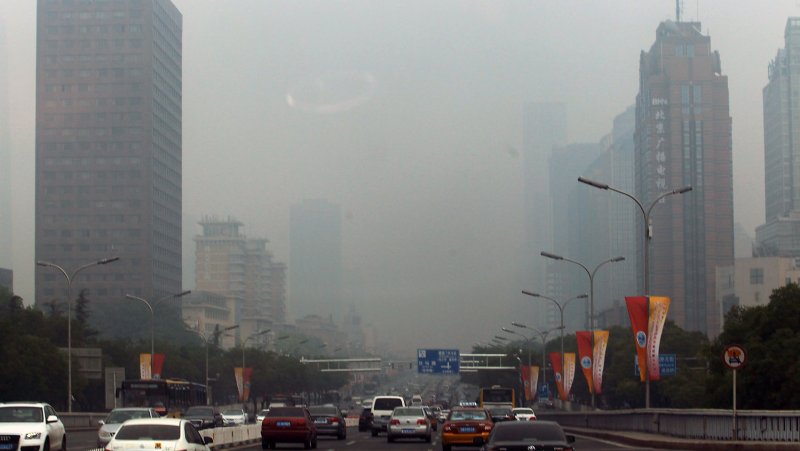Grey skies, rated as "Harzardous" air quality by the U.S. embassy's daily air index, hang over Beijing on June 6, 2012. UPI/Stephen Shaver |
License Photo
LOS ANGELES, Nov. 27 (UPI) -- Pregnant women exposed to high levels of air pollution from traffic may be linked to higher levels of autism, U.S. researchers suggest.
Heather E. Volk, assistant professor of research at the University of Southern California Keck School of Medicine, said children exposed to higher levels of traffic-related pollutants during pregnancy or during the first year of life were at increased risk of autism compared to children exposed to the lowest level.
The study, published in the Archives of General Psychiatry, said the highest exposures to pollution were linked with a two-times-higher risk of autism, while high levels during the child's first year tripled the risk, WebMD reported.
Air pollution has been linked with a variety of ill health outcomes, including babies being born small for their gestational age, so looking at air pollution and autism risk makes some sense, Volk said.
In an earlier study, Volk's team reported a higher risk of autism for children whose families lived within about 1,000 feet of a freeway, but for the new study, the researchers analyzed data from 279 children -- ages 2-5 -- with autism and a comparison group of 245 children without autism.
Volk said they used the mothers' addresses to estimate exposure to air pollution such as particulate matter and nitrogen dioxide during each trimester of pregnancy and during the child's first year of life.
"Now we consider how busy the road was, traffic density, volume of traffic, and how often the road was traveled," Volk said.
Exactly why pollution is linked to autism risk is not certain and more research is needed, Volk said.
A blog at Boston.com said while the researchers offered plenty of good scientific reasons to explain how it could be plausible for toxins in the air to interfere with the delicate neural wiring that's laid down in the brain during the first crucial years of life.
But the researchers weren't able to directly measure the levels of pollutants the mothers were exposed to during their pregnancies or shortly afterward and they used weather data and traffic volume estimates for emission rates.
All of these caveats don't necessarily invalidate the findings, but they point to a larger issue: the need for better designed, better funded studies to determine with more finality what's leading to the precipitous rise in autism in U.S. children, the blog said.















